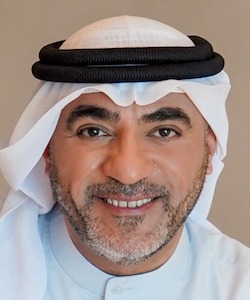
UAE - Industry
Mitsuru Anezaki
CEO, Al Gharbia Pipe Company
Bio
Mitsuru Anezaki holds a bachelor’s degree in social sciences from Hitotsubashi University in Japan. He Al Gharbia Pipe Company (AGPC) as the first General Manager in October 2017, where he was seconded from the Japanese shareholder, JFE Steel Corporation, to spearhead the operation of AGPC in Abu Dhabi. Prior to his role in the UAE, Anezaki was leading JFE Steel’s Energy Industry Steel Products Export Department as General Manager. He commenced his career with Kawasaki Steel Corporation in 1986. Since then, he has worked for over 30 years mainly in the steel export business for the energy industry at Kawasaki Steel, which later became JFE Steel, including four years at its London Office.
What have been your main landmarks and accomplishments in the last year?
We started commercial production in September 2019. We started initially on the simple pipe products with the goal of improving our capabilities and gradually acquiring more qualifications. However, six months later COVID-19 broke out, oil prices fell down sharply, and all projects were postponed. In other words, the demand was disappearing. In 2020, we only produced 10,000 tons the whole year, which is unsustainable; however, in 2021 picked up slowly, and we were awarded our first pipeline project by ADNOC Gas Processing for KM42 project. It was a stringent sour gas service application with a small quantity. This is our real start and since then until now we have been awarded seven ADNOC Group pipeline projects with a total quantity of 64,000 tons without any loss of opportunities as far as ADNOC projects are concerned.
How does ADNOC tender the projects?
It is primarily an industry standard competitive bidding process, although ADNOC seems to be more enthusiastic to foster competition. Even though we are 51% government, we have no substantial priority because almost all pipeline purchase is done by EPC contractors. We normally enter bidding processes tendered by EPCs, and we face competition, especially from India and China, which have lower costs and vast local demand. EPC then may give us an opportunity chance to adjust our price. If we match its conditions, it awards us the bid. Since EPC has strong incentive for lowering cost, they do not necessarily prioritize ICV scores. That is the current system.
Which EPC contractors do you actively work with?
We work with local EPCs like NPCC, Al Nasr, also international players such as Saipem and Petrofac. Currently, Chinese players are active, such as China Petroleum Pipeline and Engineering Co. (CPPE) and China Petroleum Engineering and Construction Co. (CPEC). Both are Chinese state-owned oil and gas giant CNPC-related EPCs.
How does Al Gharbia Pipe Company contribute to the Emirates’ diversification efforts?
Our pipeline quality and technology are important technological manufacturing in this country. This is an asset to diversify in this country because there are no pipeline companies like us. We intend to do so, and it is in the process. We are heading in the right direction. We are now seeing various pipeline projects restarting. We faced many challenges in the last two years, though now we are back on track.
Have you seen any price fluctuations, sourcing difficulties, or logistic challenges in the recovery phase?
Like all energy materials, prices are still hiking, and it is a tight situation because of the pandemic. In the recovery phase, all materials are required. It is a challenge for us, and delivery is limited. We want to solve all this promptly. If the raw material price increases, we should convey the price to the end user. It will be a challenge because the energy and steel industries are different. In the energy industry, specifically oil and gas, people do not have positive perceptions. Generally, oil and gas industries will not be sustainable in the long run, which is why ADNOC is also keen to maintain competitiveness. We are already lobbying the government, as almost all countries with a steel industry have protectionist measures like import duties and safeguard measures.
How are you engaged with the energy transition from an industrial perspective?
Our vision is to deliver tubular solutions for safe and sustainable industrial development, which means whatever inside in pipes, we will supply pipelines and related solutions by way of steel tubulars. For example, we are investigating the potential of a hydrogen pipeline. Produced hydrogen has to be transported. Various highly advanced materials are required depending on energy we try to transport. The other renewable energy is wind farms. It needs to be set up on a sea, and it requires supporting material that we can provide. We are trying to contribute to various industry developments we can support in addition to the oil and gas industry.
When you look at 2022, what are your main priorities?
I am quite positive about next year onwards as we can see various projects going on. We need to be profitable and sustainable. We suffered greatly in the last two years. It is good that ADNOC awarded us its largest scale pipeline. We have already completed five projects for ADNOC; tonnage wise they were not too big, ranging from 1,000 to 6,000 tons. However, next year, the biggest project so far will come from the main oil lines replacement of 42,000 tons, about four months of production. In 2022, there will be different production levels and another big project up to 200,000 tons, mostly from ADNOC are expected.
ADVERTISEMENT
ADVERTISEMENT
You may also be interested in...

UAE - Telecoms & IT
Hussain Al Mahmoudi
Interview
CEO, Sharjah Research Technology and Innovation Park (SRTIP), UAE



